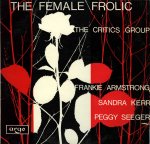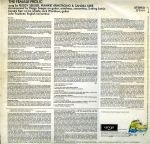(1968) The Critics Group – The Female Frolic
 Argo issue number: DA 82 (mono), ZDA 82 (stereo), reissued May 1972 as ZFB 64.
Argo issue number: DA 82 (mono), ZDA 82 (stereo), reissued May 1972 as ZFB 64.
Availability: never released on CD
Performers
Peggy Seeger – vocals, guitar, autoharp, concertine, 5-string banjo
Frankie Armstrong – vocals
Sandra Kerr – vocals, tin whistle
Jack Warshaw – guitar
John Faulkner – English concertina
Tracks
 Side One
Side One
The Doffin Mistress (trad) – SK, FA, PS vocals
Girl of Constant Sorrow (Sarah Ogan Gunning) – PS vocal, autoharp
The Blacksmith (trad) – SK vocal
My Husband’s Got no Courage in Him (trad) – FA vocal
The Generous Lover (trad) – FA vocal
The Whore’s Lament (trad) – PS lead, SK & FA chorus
Georgie (trad) – FA vocal
Come Me Little Son (MacColl) – SK vocal, PS autoharp, JW guitar
Side Two
The Female Frolic (trad) – FA vocal, PS concertina, JW guitar, SK whistle
Children’s Songs – All the Boys in our Town (SK)/I built my lady a Fine Brick House (PS)/Collier Lads (SK & guitar)/Broken-hearted I Wander (SK, FA)/The Lady from Leigh (FA, SK)
All Around the Shoe Round – PS, vocal, banjo, FA, SK chorus
An Old Man Came Courting Me (trad) – PS vocal
Miner’s Wife (MacColl) – FA & SK vocals, PS & JW guitars
The Factory Girl (trad) – SK vocal
Lowell Factory Girl (trad) – PS lead, SK and FA chorus
The Broomfield Hill (trad) – SK vocal, JF concertina
The Housewife’s Lament – PS lead, SK and FA chorus plus “two guitars”
Excerpts from the sleeve notes
“The battle of the sexes has been raging throughout human history and shows no signs of stopping in the foreseeable future. Indeed, life would be very dull if it did…
“Great writers from the time of Aristophanes to the present day have drawn inspiration from the sometimes tragic, sometimes hilarious incidents of this battle and so also have innumerable and mostly unnamed poets of the folk tradition. It is with the attempts of this latter group to delineate some of the many aspects of woman’s life that this record is concerned.
“In the late 1950s, the British folk song revival grew out of the craze for American skiffle and, at first, singers tended to base their repertoires on the folk-songs and blues of North America. However, in searching for the origins of Appalachian music, they turned their eyes back across the Atlantic and rediscovered the ballads and songs of their own islands.
“The singers of the British folksong revival, who originally thought their native music dowdy and unexciting, were astonished to find a rich tapestry of song waiting to be explored. Men and women alike chose their repertoires with little consideration towards their sex.
“For example, it was not uncommon to hear pretty and solemn young girls performing songs from the labouring industries such as mining, or singing tough and lusty sea shanties in voices that would have been reduced to inaudibility by the gentlest of Atlantic zephyrs.
“This certainly was not so for singers in the oral tradition. Many of the finest traditional performers have been women and in many instances it has been the sole responsibility of the female to carry the songs and traditional style of singing to the next generation…
“Frankie Armstrong, Sandra Kerr and Peggy Seeger are all members of the Critics Group, which meets regularly to discuss and explore the art of folksong and how best these arts can be applied in the revival. They felt that there was a need for a record to trace the Woman’s constantly changing position in terms of traditional folksong and to try and open up the large and varied repertoire available to the female revival singer.”


